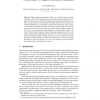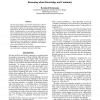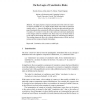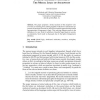107
Voted
CONCUR
2010
Springer
15 years 1 months ago
2010
Springer
Higher dimensional automata (HDA) are a model of concurrency that can express most of the traditional partial order models like Mazurkiewicz traces, pomsets, event structures, or P...
ATAL
2010
Springer
15 years 1 months ago
2010
Springer
The paper applies modal logic to formalize fragments of argumentation theory. Such formalization allows to import, for free, a wealth of new notions (e.g., argument equivalence), ...
111
click to vote
AIML
1998
15 years 1 months ago
1998
Abstract. This paper presents a resolution decision procedure for transitive propositional modal logics. The procedure combines the relational translation method with an ordered ch...
92
Voted
FLAIRS
2006
15 years 1 months ago
2006
The aim of this paper is to extend the modal logic of knowledge due to Moss and Parikh by state transformers arising, eg, from actions of agents. The peculiarity of Moss and Parik...
101
click to vote
AIML
2006
15 years 1 months ago
2006
We propose a framework for comparing the expressive power and computational behaviour of modal logics designed for reasoning about qualitative aspects of metric spaces. Within this...
124
Voted
AIML
2006
15 years 1 months ago
2006
We see a systematic set of cut-free axiomatisations for all the basic normal modal logics formed by some combination the axioms d, t, b, 4, 5. They employ a form of deep inference ...
DAGSTUHL
2007
15 years 1 months ago
2007
Abstract. The paper proposes a logical systematization of the notion of countsas which is grounded on a very simple intuition about what counts-as statements actually mean, i.e., f...
104
Voted
AIML
2008
15 years 1 months ago
2008
There are two reasons why medieval logic is of interest to modern logician: One is to see how similar it is to modern logic and the other is to see how different it is. We study th...
102
Voted
AIML
2008
15 years 1 months ago
2008
We present a complete axiomatization of a logic denoted by MTML (Mereo-Topological Modal Logic) based on the following set of mereotopological relations: part-of, overlap, underlap...
93
Voted
DEON
2008
Springer
15 years 2 months ago
2008
Springer
The paper proposes a formal analysis of the ascriptive view of norms as resulting from pulling together Anderson's reductionist approach, the analysis of counts-as, and a nove...




